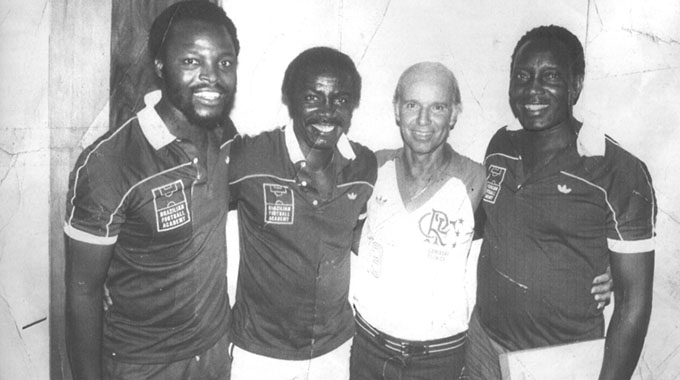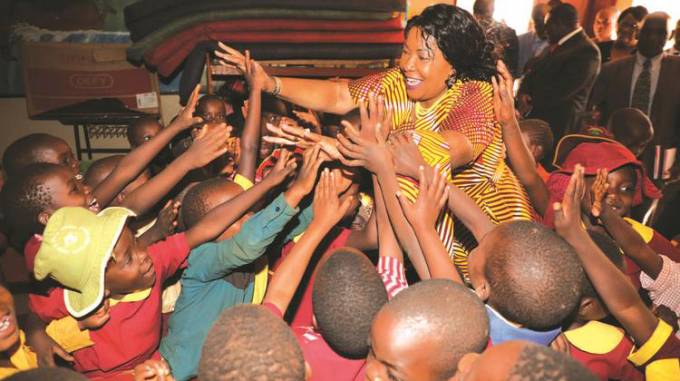‘My time as head coach is up’

Eddie Chikamhi Senior Sports Reporter
SUNDAY CHIDZAMBWA says his time in the trenches of coaching, as a head coach, ended at the 2019 AFCON finals but he remains open to offers to work as a technical expert.
The 67-year-old, the greatest Zimbabwean football coach, clarified last night that he had not completely walked away from the game after social media was awash with reports suggesting he had retired for good.
‘‘Let me correct some of the things I have been hearing and reading since the interview I gave this week came out,’’ he told The Herald.
‘‘I have not retired from football but I have said I will never be a head coach again, from now onwards, but I am available to offer my services as an expert in other capacities.
‘‘I can be a technical adviser, to someone who will be coaching the team, and it’s something that I can do from the stands, or even on the bench, depending on what those who like my services are comfortable with.
‘‘But, what I can say loud and clear, is that I will never be a head coach of any team again, that time is over, but I remain in football because this is my life.’’
Chidzambwa, the first man to captain the Warriors after Independence, believes it is time for the younger generation of coaches to take the game forward.
He led the Warriors to the AFCON finals twice and also reached the final of the Champions League with Dynamos.
“I can say my days as a coach are over because I’m turning 68 this year,’’ he told our sister radio station, StarFM.
‘‘So, for me to be seen running around and shouting orders from the bench, it won’t be possible.
‘‘I have to leave that to the younger generation but playing an advisory role, and helping other coaches, that I can do.
‘‘How people view my career and contributions to Zimbabwe is entirely up to them.
‘‘Whether they applaud it, or they see no value in it, it’s entirely up to their opinions.
“In short, my time as head coach is up. I need to give the younger ones, with modern ideas, as they say, a chance.’’
The veteran coach has been keeping a low profile since he quit his job as Warriors gaffer last year.
He has had several stints with the national team and holds the distinction of being the first to lead the Warriors to their maiden AFCON finals in 2004.
He guided the team to the tournament again in 2019 and has won the COSAFA Cup a record four times as Zimbabwe coach.
“I remember when we first qualified for AFCON in Tunisia, the journey was not that smooth. The players struggled even to get their allowances,’’ he said.
“On reflection, the monetary incentives were just too little compared to what the players are getting these days.
‘‘I am not saying the players these days are bad but that time it was more for the love of the game.
“The most important thing above all was to break the jinx. It had taken us 23 years but when we broke the barrier, it made everyone believe it is possible and we have been qualifying for the finals.”
Chidzambwa trained as a coach in Brazil in the 1980s after he hung up his boots prematurely because of a serious injury that left him walking with a limp up to this day.
During his playing days he also had a stint at Aston Villa after the club arranged a one-month attachment.
“I started getting involved in coaching at Dynamos as a player. I joined Dynamos in 1977 and the following year I was appointed captain,’’ he said.
‘‘I was again named the national team captain.
“And, when you are the captain, you assume the role of the coach on the pitch, so this helped me a lot and made it easier for me to make it into coaching.
“I had a one-month attachment at Aston Villa organised by Dynamos during my days as a player. It was (there), myself and Shaw Handriade.
‘‘We had been tasked to go and study how they go about their business and come back to help our coach, who then was Shepherd Murape.
“I learnt a lot about English football in that short stint. From there, I went to Brazil twice and I think the exposure was very helpful.
“I also worked as assistant to Reinhard Fabisch in the national team and the experience was priceless. I can say it helped shape my coaching career. I would not have achieved what I achieved in coaching without that exposure at Aston Villa, Brazil and working under Fabisch.”
The former defender also has an impressive resume at club level after winning a number of trophies with Dynamos.
He also lead them to their only CAF Champions League final in 1998.
No other team, or coach, has been able to replicate that feat since.
“I think the experience and exposure I got helped a lot. Then, the players that I worked with at Dynamos were disciplined and they had so much ambition to succeed,’’ he said.
“In 1998, when we reached the final of the Champions League, it was a combination of factors — from the executive, who were very supportive.
‘‘The guys in management were also very ambitious and made everything easier for the team. We didn’t have any excuse not to perform.
“The likes of George Shaya, Lesley Gwindi, (Lloyd Hove), and Bernard Marriot took care of the money issues.
‘‘We didn’t have problems with the players and what we knew when we went out was to aim for our target to win and reach the final.’’
He also had stints in South Africa, taking charge of Free State Stars and Black Leopards.
His last club job was at ZPC Kariba.
“As a person, who played and coached football, I accept constructive criticism,’’ he said.
‘‘So, when I select a team, I cannot please everyone. I am human, made of blood and flesh, a football coach is not superhuman.
‘‘Everyone makes mistakes, people must understand that. I don’t like conflict and tensions and when a situation comes to that, I always step aside.
“Many times I have heard people say so-and-so is an old-fashioned coach because they are aged.
‘‘But, in football it’s not like that, those people are lying because we learnt about most of the concepts implemented in football today a long way back.
“There is nothing new. Football has not changed but I would say it’s the coaches that are different.’’
Chidzambwa’s playing career was cut short when he got injured on September 23, 1983. Interestingly that was supposed to be his last season.










Comments